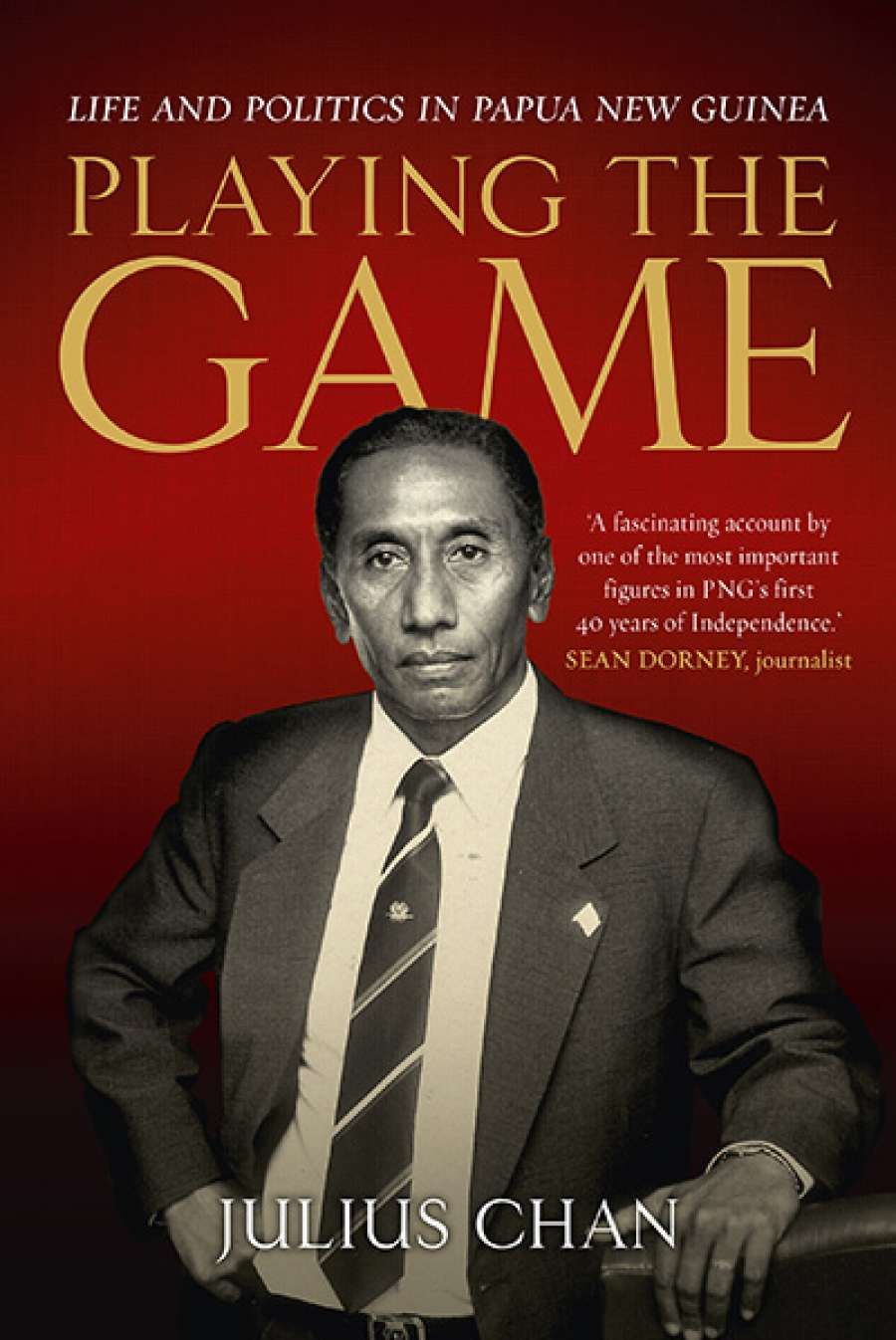
- Free Article: No
- Contents Category: Memoir
- Custom Article Title: Lyndon Megarrity reviews 'Playing the Game: Life and politics in Papua New Guinea' by Julius Chan
- Book 1 Title: Playing the Game
- Book 1 Subtitle: Life and politics in Papua New Guinea
- Book 1 Biblio: University of Queensland Press $32.95 pb, 256 pp, 9780702253973
Chan has crafted a compelling autobiography which helps us to understand both the man and the times in which he has lived. What makes Chan so fascinating is that he has been both an insider and an outsider in the country of his birth. The son of a Chinese-born businessman and a PNG mother, Chan's formative years gave him an appreciation of both the modern, Western-dominated world and the traditional culture, spiritualism, and attitudes of PNG villages and towns. Some of the most moving passages in the book concern his attachment to family and the places that hold great significance for him: 'When I die, I will be buried back at home. It is serene, quiet and it depicts my whole life ... In a hundred years from now that is where you can come and visit me. By the sea, at Huris.'
Almost inevitably, Australia casts a long shadow over Chan's memoirs. From 1914 to 1975, Australia was, to all intents and purposes, the colonial ruler of the entire territory of PNG. After independence, Australia as an aid donor and regional power has maintained a strong interest in PNG affairs. Chan was a member of an élite group of Papua New Guineans who spent many of their formative years in Australian boarding schools. He subsequently gained experience in the pre-independence PNG public service, and, as a politician, helped create the financial and administrative structure needed to make PNG work as a nation. Chan's memoirs recall the many Australians, often very colourful, who contributed in their own way to the emerging nation of PNG. Yet, by the time of his second premiership, Chan felt that Australian politicians were becoming aloof and out of touch with Papua New Guinea:
Paul Keating knew that Papua New Guinea existed, but he always behaved as if he was trying to live with the upper echelon of people, the intellectuals ... When he attended the South Pacific Forum he seemed to fly over these little countries ... He would talk about bringing the economic co-operation of Asia and he ... projected the image of Australia as a significant player.
In fairness to Keating and other Australian officials of the 1990s, Australia had and still has a difficult balancing game to play when it came to engaging with the South Pacific. On the one hand, Australian representatives needed to play a constructive role in the region; on the other, they were compelled to pursue the national interest of Australia as a middle power. Too little engagement with PNG could be interpreted as neglect; too dominant an Australian contribution might be interpreted as neo-colonialism.
Chan's narrative of the Sandline affair in his second term as prime minister serves to highlight Australia's somewhat awkward relationship with Papua New Guinea. The Sandline affair revolved around the hiring of mercenaries to assist the PNG defence force to regain control of the PNG island of Bougainville. For several years, a local rebel army had challenged PNG sovereignty over this territory. Significant mining activity on the island had also ceased because of local anti-mining sentiment. According to Chan's narrative, the case for hiring the Sandline team of mercenaries was straightforward: end the bloodshed, restore order, and cease the annual waste of millions of PNG currency on the Bougainville dispute.
 Former prime minister of Papua New Guinea, Sir Julius Chan during the Sandline affair (photograph by Torsten Blackwood, via ABC News)
Former prime minister of Papua New Guinea, Sir Julius Chan during the Sandline affair (photograph by Torsten Blackwood, via ABC News)
The story of the Sandline saga has been told by Mary-Louise O'Callaghan and other authors: suffice it to say here that the PNG defence force under Jerry Singirok prevented the mercenaries from going ahead with the scheme, and Chan's prime ministership was dealt a fatal blow. Chan regarded Australian pressure to abandon the scheme as unwarranted interference: 'We play by the rules and the rules are that you are not to interfere with a sovereign government ... this is a decision made by Papua New Guinea as independent nation.'
Playing the Game is a convincing and cohesive self-portrait. The author skilfully addresses the themes of national development, the PNG way of politics, and the spiritual importance of the land for the people. Chan allows himself to become a little nostalgic about the early days of independence, but is otherwise a keen observer of contemporary Papua New Guinea. University of Queensland Press is to be congratulated on the care it has taken in presenting the finished work: a useful map of Papua New Guinea and a fine collection of photos complement the text. Readers will enjoy getting to know this important figure in PNG political history.


Comments powered by CComment